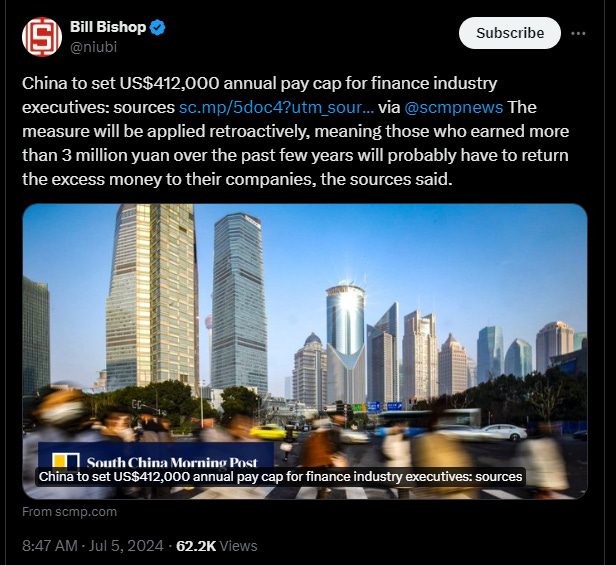The Jordan Belfort of Lujiazui
Despite the spirit of "criticizing generally", I unsuccessfully fought my urge to name names...
Welcome to all new subscribers and thank you for the feedback/comments!
For those who are new, here is what I do and what I don’t do.
This piece does not have any direct investment implications for a specific stock. It does however, characterize some of the issues relating to the publicly listed brokerages (CICC, CITIC, CSC Financial, Huatai etc)1. If you’re invested in these companies, this will be useful context from a industry perspective. As a preview, I will have a follow up on the Moutai piece next given how quickly things have moved (special thanks to the friend who sent me the UBS Report from July 26).
Most importantly, however, I hope to give you a better understanding of ‘the playing field’ in terms of your peers in the investment industry (“this is who you’re up against”) - knowing your competitors is important - I cannot possibly claim to be a serious investor in China if I don’t quote Sun Tzu at some point:
“If you know the enemy and know yourself, you need not fear the result of a hundred battles. - Sun Tzu
If you’ve watched The Wolf of Wall Street,2 and you care about China, you likely have seen the headlines about salary cuts in the financial services industry. This fiasco was elevated to national attention due to the sad and unfortunate incident involving the death of a CICC employee.
Thus far no English sources I’ve read have dived into the underlying debauchery dynamics of the financial services industry in China and the genesis of the supposedly sudden regulatory push into the financial services industry. Majority of the coverage has framed this regulatory push as a ‘big bad regulatory hammer attacking innocent high income urbanites’, but as usual, there is much more than what meets the eye.3
I won’t go in-depth about what happened as you can easily read up the many news articles describing the new pay caps and how perpetrators were ‘encouraged’ to disgorge their ill gotten gains4.
However, as you’ll see below, this regulatory push is far less surprising if you understood some of the nefarious things that were happening among our peers in the industry in China. Suffice to say, they would’ve made Jordan Belfort proud.
Inspired by
’s memo from a Political Staffer in the Chinese Embassy in DC reporting back to Zhongnanhai on the shitshow of a presidential campaign in the US, I will be reporting on the shitshow in the Chinese Financial Services industry as if I was a Securities Exchange Commission attaché in the US Consulate in Shanghai, in the style of Matt Levine.5And yes, I woke up and chose violence today.
Date: July 26 20:00 PM EST
Topic: FINANCIAL SECTOR REGULATORY UPDATE
Officials in China have begun a latest round of regulatory remedies in the domestic financial sector. I believe these actions are a follow up to the Central Financial Works Conference held in October 2023.
CSRC in coordination with CDIC have begun rounding up suspects, and sources at Fidelity and Goldman Sachs in Shanghai informed me that regulators are serious about rectifying “repeated financial disorder and corruptions” and “weak financial supervision and governance capacity” raised at the Central Financial Works Conference last year. Below I summarize three specific case studies.
MUSICAL CHAIRS WITH BAGHOLDER6 CHARACTERISTICS
Long-only equity investors are supposed to find stocks that go up (or stocks that go down less than the respective benchmark) while managing risks. This is how an investment firm delivers value to clients. If successful, investors give you more money to manage. Management fees are generally a % of the assets they manage. Ergo, the more successful you are, the more money you are likely to manage, and more money you make. This is how Joel Tillinghast did it in the US, how Chris Hohn did it in the UK, and how Li Bei7 did it in China.
And presumably, this is how most investors are trying to succeed in China.
However, this is where we diverge. Enter Mr. Cai Songsong.
Cai Songsong is a fund manager who became a star during the 2019-2020 bull market. Cai's strategy was simple: bet everything on semiconductors. There is a Chinese saying that “pigs can fly with the right tailwind”, that was Mr. Cai. The sector boomed, retail investors, conflating the tailwind for the pig's ability to fly, piled in. His AUM ballooned to ~40 billion RMB. With a bloated ego, Cai reveled in his newfound fame. But as the sector cooled, so did the fund's value, and reality set in.
Up to this point, losses can simply be chalked up as incompetence or inappropriate risk control.
Now come the shady capital alligators who at some point approached Cai with a proposal: "Hey, how about a side gig?" they asked. Cai, cautious at first, was eventually swayed by promises of quick gains which was “perfectly compliant” with operating procedures at his firm.
The proposal went something like this: “Here’s a list of stocks we own and want you to buy after they go up 100%, and as you pile in with your funds, we’ll dump the shares onto your unit holders - bring in some dumb foreign money while you’re at it too. Spread your trades across different funds, no one will notice. We’ll pay you a million each stock plus commission. Deal?"
Long story short, Cai couldn't resist the urge for a quick buck (or millions of bucks). Presumably there were other managers who tried to do this but in less egregious ways and I’d assume they’ve been asked to disgorge their ill gotten gains in previous years.
In the end, retail investors are left holding the bag, their portfolios looking as if they traded on the advice of Jim Cramer. I’d expect regulators to continue with this heavy handed enforcement. That being said, I wouldn’t go as far as calling this scheme the “Songsong Scheme” - Ponzi still has a better ring to it.
Legally speaking, it would appear that the cost (reputational, financial, legal) of setting up a rat trading operation is insufficient vs. the potential reward (millions per trade), and this is something that regulators will need to figure out over time.
HIRING: DISORGANIZED, OSTENTATIOUS
Admit it, you all have come across the otherwise low key but impeccably dressed intern with an innocently ostentatious last name (“Bush”, “Turnbull”, or, as a friend once told me, “Moelis”). However it seems that the modern Chinese aristocracy has not yet figured out the balance between ensuring their offsprings get ahead vs. completely disenfranchising the proletariat.
Enter Alex Wang Qiaochu. Alex is a first year student at Huazhong University of Science and Technology who interned at CSC Financial in the Investment Banking department (to give you a sense, this is equivalent to some first year kid on a Football scholarship at Michigan State interning at Morgan Stanley IBD). Eager to impress his followers on Douyin, Alex posted videos of himself driving to work in a Porsche 911, donning a Harvey Specter style suit (peak lapel #IYKYK), and leaving work at 3PM to play golf, before attending to a badminton game with friends and going home. Alex seems to enjoy a very healthy lifestyle, but he’s not exactly the standard issue IBD grinder.
But this would’ve fine - he would’ve been just known (and judged) by his fellow interns and the staffer as someone with poor work ethic (not that he ever needs to work given the golden spoon he grew up with). He could’ve presumably been the son of a VIP client who could bring in lots of dealflow for the bank - quid pro quo, this happens.
Where this gig really went south for Alex was when he started posting pitch decks with client names, confidential IPO projects, and him visiting clients’ locations while showing the client logo - basically everything you’re not supposed to do as an investment banker. The entire fiasco blew up like a storm and made it to the top of the Weibo trending list. Netizens were able to dig up all sort of dirt about Alex - that he was a Physical Education student (does he even know Excel?) who competed in martial arts competitions (which I suppose could’ve been useful in that physical fight between two brokers in 2017). It looks like Alex’s martial arts expertise will be used to pummel the financial services industry (pun intended).
Naturally, Alex was summarily terminated and CSC Financial was forced to apologize in public. The takeaway here, is not that nepotism should not exist (it will), but rather that the Chinese aristocracy has not learned the ways of discretion8 of how old money aristocrats operate elsewhere in the world. America has much to teach to the nouveau riche in China. I believe this is where the SEC can work with the CSRC - highly consistent with Secretary Blinken’s “collaborate where we can” policy towards China.
UNSUSTAINABLE ARMS RACE
(Relax, this has nothing to do with Unit 61398 of the PLA)
Buyside investors are trying to make better decisions - that comes through better data, better analysis, or better behavior (I won’t repeat this concept as you can learn it from Mauboussin’s many podcasts on this topic). Relationships with key industry contacts are also helpful, provided that you have legal and immaterial nonpublic information.
Sellside brokers are trying to get more trades from buyside investors - this comes through providing better data, better analysis, or superior services. This frequently involves entertainment and gifting - a dinner here, a pair of basketball tickets there, you know, reasonable things in any kind of client-patron relationships.
However, buyside and sellside in China have taken this to the extreme:
“Value Added Services”
In 2022 when Shanghai was locked down, Xinhua News and the Shanghai Health Commission had daily updates on the number of infected patients - like many other cities did around the world. A prominent sell side analyst would cryptically message clients with digits that magically matched with the reported number of COVID infectees reported by the Commission a day or two later - showing off his “access”. This same prominent sell side analyst was investigated with nefarious personal conduct (inappropriate venues were selected to entertain clients, to say the least) as well as allegations of operating pump and dump schemes.

While no midgets were harmed, rumour has it that this person is likely to be made an example as was Jordan Belfort. Time well tell what becomes of this individual.
“Thou shalt pick stocks that go up within 2 weeks”
Stock picking is hard - all the high achievers with Ivy League educations (or equivalent tertiary education) will eventually get used to being ‘pedestrian’ as an investment professional with a batting average of slightly above 50%. In general, as I said earlier, one needs to pick stocks that go up (or go down less than the benchmark). However, it’s become recently stipulated that investment professionals at certain institutions in China must only make recommendations if said stock can go up within 2 weeks. I don’t know about you, but I have no idea how to invest fundamentally if I was given a time horizon of 2 weeks. You may as well hire chimpanzees.
Jokes aside, the perverse incentives of this type of incentive mechanism is what likely led to some of the shenanigans that’s happened. Regulators seem keenly aware of the issues, calling multiple times for ‘long term patient capital’. Though the jury is out on the completeness and correctness of execution.
I was going to also write about the various profligate and promiscuous personal pieces of gossip, but they are not befitting of further attention as they are not relevant in the grand scheme of things; nor are they illegal (and more par for the course on Wall Street). Although, I would be remiss to not point out that this is where Lujiazui has learned from the very best on Wall Street.
Suffice to say, a big swath of the Chinese investment industry is not quite ‘institutional ready’ for global investors and are too busy imitating Jordan Belfort. Our financial giants need not worry about credible competition anytime soon.
LEVINE, ATTACHE, SECURITIES EXCHANGE COMMISSION, SHANGHAI
END MEMO
Evident by the Hall of Shame nominees, it would appear that these scumbags watched Wolf of Wall Street and learned from Jordan Belfort unironically, and filed all of the things Jordan Belfort did under “How to scam clients and get rich”.
The ultimate irony of this situation is that the aim of the regulators is to clean up the investment industry by ensuring fairer conditions (equal treatment, foreign and domestic investors alike) as opposed to overregulate. If anything, pay caps will redirect smarter people elsewhere so the competitive landscape gets easier over time. Paradox of skill, people, also works the other way!
So I don’t quite get why rule abiding foreign investors are complaining about this.
If CSRC was ever reading this…here’s my policy recommendation:
Set up a robust ethical enforcement mechanism with a financial incentive9 for rewarding those who report ethical violations - to be paid as a portion of the fines. In following the highly successful walking 500k10 campaign by the MSS, CSRC too shall benefit from the watchful eyes of Chaoyang District laobaixing11. Additionally, it would do wonders in setting up the green/yellow/red lights for employees in the financial services industry with clear incentives. Finally, regulators can more precisely target nefarious actors without nuking an entire cohort of workers in this space.
These less than kosher characters are representative of the industry cockroaches that were responsible for roping investors into the high yield bonds issued by Evergrande, for the insider trading and ponzi schemes, and most importantly, structurally polluting/poisoning the culture of the investment management industry in China.
There are many Buffett-like investors in China who focus on long term fundamentals12 and do the right things - but because they truly ‘drank the Buffett Kool-Aid’, they tend to stay away from spotlights so most people don’t know them.
The China that the YouTube travelers saw was built despite the shenanigans by similar bottom of the barrel scumbags in other industries, meaning that the majority of people did the right things at the right time most of the times.
I believe this is the case in the investment industry as well - so, to sign off, I tip my hat at those investing in China who are fighting the good fight13 - investing ethically/legally - and walking the talk that so others talk but do not walk, and my thoughts and prayers are with them as they have to deal with the salary cuts in this downcycle.
The so called ‘三中一华’ - it functions as a prestige ranking system for newbies looking to enter high finance in China.
If you haven’t you should stop reading and watch it before reading this, otherwise you won’t get the references.
Although, to be clear, many innocent high income urbanites were impacted.
One of my favorite legal terms, see here for specific description.
High bar, I know. But one can try.
I thought long about this, and the word to describe ‘韭菜’ (Chives in Chinese, which is used as a pejorative to describe dumb retail money) is best translated as ‘bagholder’.
Moatless Musings is an equal opportunity publication - apologies to Deng Xiaofeng.
In Chinese this would translate to something like: 吃相太难看, which literally means ‘poor dining etiquette’. Aristocracy should at least dine with civility when they feast on the fruits of labor of the proletariat, no?
Consistent with Xi Jinping Thought on Socialism with Chinese Characteristics for a New Era, this entails leveraging the market forces to play a decisive role in allocating resources - specifically, operationalize inherent human greed to channel it for a source of good by making it profitable to be ethical.
This is a meme in China where those who report infractions of state security to the Ministry of State Security would receive an award of 500,000 RMB - and as such those who commit acts of treason are labeled as ‘500k of cash walking around’.
Many celebrities who’ve committed nefarious crimes in China (soliciting, recreational drugs etc) have been caught by Chaoyang District Police who received tips from people living there, earning the district in Beijing a reputation of having "雪亮的眼睛” (which translates to something like “eyes clear as ice”)
There are people who bought Moutai at such a cheap price that the annual dividends they receive range from 30-100% of their cost base.
If you’re not, well, as Uncle Xi says, “别看今天闹得欢,小心日后拉清单”. Or, as Russell Peters would say: “Somebody’s gonna get hurt rrreal bad”.








Thanks for sharing, very insightful